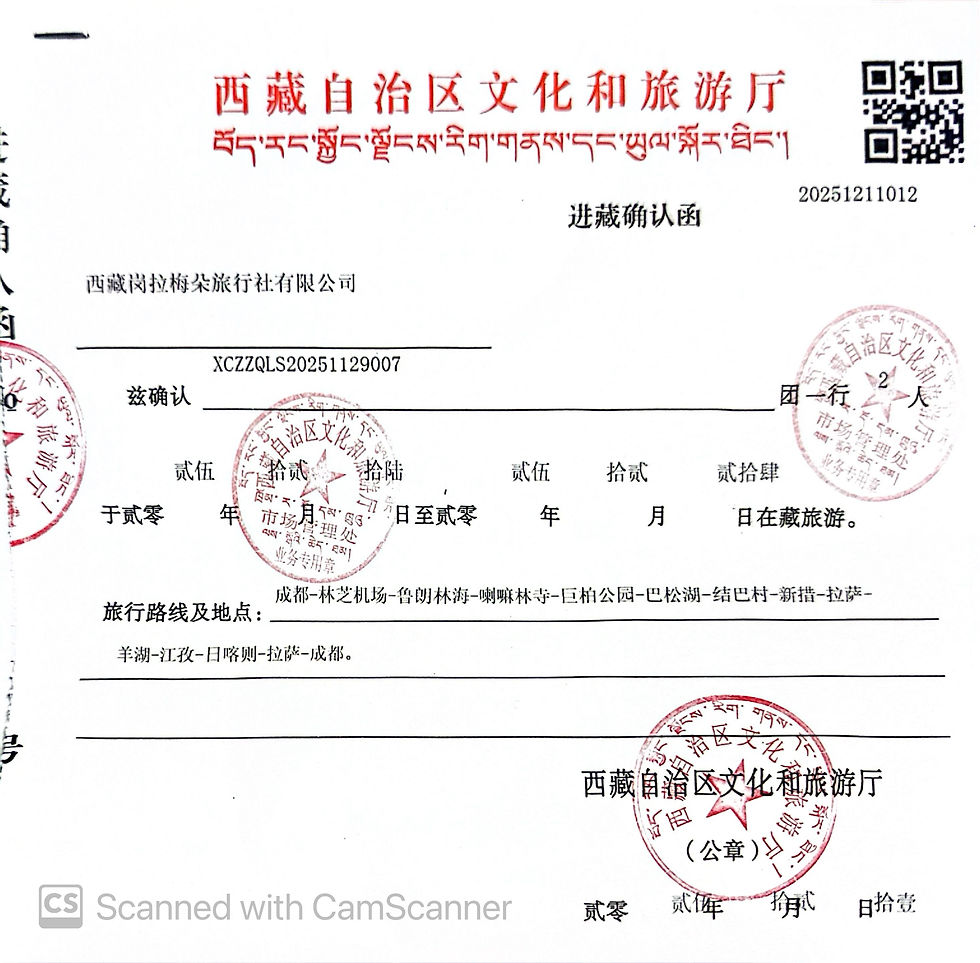Tibetan Holidays in Tibet: A Journey Through Festivals and Traditions
- tibetantours
- Sep 23, 2025
- 3 min read
Part 1. Losar – Tibetan New Year 🎉
Among all Tibetan holidays, Losar (ལོ་གསར་) – meaning “New Year” – is the most significant and widely celebrated. It usually falls in February or March, depending on the lunar calendar, and lasts up to 15 days, though the first three days are the most important.
Preparing for Losar
Weeks before Losar, families begin their preparations. Homes are thoroughly cleaned to sweep away the misfortunes of the past year and to welcome fresh, positive energy. Colorful new prayer flags are strung across rooftops and mountain passes, fluttering in the wind as offerings of peace and compassion.
Special foods are prepared in advance. Among them is Guthuk, a noodle soup eaten on the 29th day of the 12th lunar month. Inside each dumpling are hidden symbols like chili, wool, or charcoal – each with a playful meaning that sparks laughter around the dinner table. For example, finding chili means you’re talkative, while charcoal hints you might need to improve your temper! This lighthearted tradition brings families closer before the more formal rituals of Losar begin.
The First Day of Losar
On the morning of the New Year, families wake early and Fetching Holy Water
important Losar tradition is the gathering of “new water.” At dawn on New Year’s Day, families send a family member—often the youngest or most energetic—to collect fresh water from a nearby river, stream, or even the household tap if natural water sources are not close by. This water is believed to be especially pure and auspicious, carrying blessings for health, longevity, and prosperity in the coming year.
Once brought home, it is offered on the family altar along with butter lamps, barley, and incense. In Tibetan belief, this ritual symbolizes starting the year with a clean, sacred essence, washing away the misfortunes of the past and inviting in positive energy.
to burn incense near rivers and make offerings to household deities, spirits, and protective gods. A special offering table is set with barley, wheat, and butter sculptures, symbolizing abundance. Everyone dresses in their finest chuba (traditional Tibetan robe), and the air is filled with the scent of juniper smoke rising from every home.
It’s also customary to visit monasteries, where monks perform sacred rituals and prayers for good fortune in the year ahead. In Lhasa, the Jokhang Temple becomes a center of devotion as thousands of pilgrims gather to offer butter lamps and prostrate in front of the shrine.
The Spirit of Celebration
The days following Losar are filled with family visits, gift exchanges, and cultural performances. Tibetans greet each other with the phrase “Tashi Delek” – wishing happiness, luck, and prosperity. Families enjoy butter tea, sweet rice with raisins (called dresi), and fried pastries. Children receive new clothes and sometimes gifts of money tucked inside white silk scarves (khatas).
Village squares and monastery courtyards come alive with traditional dances, songs, and even horse races in some regions. The festival blends solemn spiritual rituals with joyous community gatherings, making it a true reflection of Tibetan life.
Why Travelers Shouldn’t Miss Losar
For visitors to Tibet, experiencing Losar is like stepping into the heart of Tibetan culture. You’ll witness a living tradition where ancient Buddhist practices meet family warmth and festive joy. The bright colors, chanting monks, prayer flags, and laughter of families create an atmosphere that is both deeply spiritual and vibrantly human.
👉 Would you like me to restructure Losar so that it flows as:
1. Preparations (cleaning, food, prayer flags)
2. Guthuk ritual (with dumpling fun)
3. First Day rituals (holy water + offerings + visiting monasteries)
4. Celebrations (family visits, food, cultural events)







Comments